The recent online experience café, held on April 15th, marked a significant milestone in fostering dialogue and collaboration among academia, the business community, and civil society representatives across the Baltic region, with a particular focus on addressing the ongoing crisis in Ukraine. The event, characterized by robust discussions and exchange of ideas, proved to be a unique platform for exploring cross-sectoral opportunities and developing principles of intercomprehension to build resilient and inclusive communities during times of crisis.
The café brought together a diverse group of professionals and leaders from various sectors that ensured a rich tapestry of perspectives and experiences, facilitating a deeper understanding of the multifaceted approaches required to address the complex challenges posed by the war.
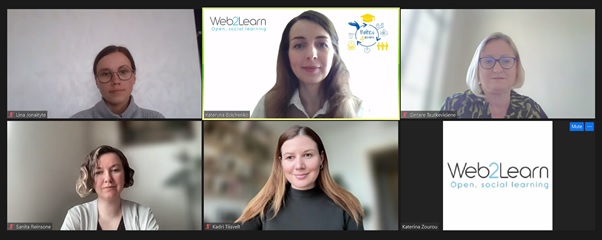
One of the highlights of the event was the presentation by Dr. Gintarė Tautkevičienė and Lina Jonaitytė on the successful collaboration between academia and society at Kaunas University of Technology, Lithuania. Their insights into fostering academic and societal partnerships illuminated the critical role of educational institutions in driving social change and community resilience.
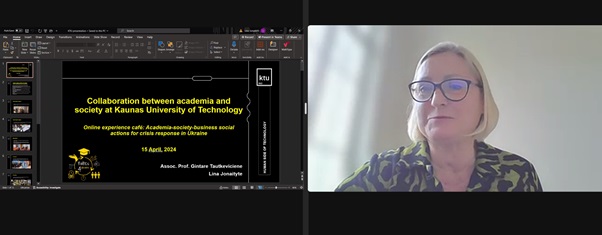
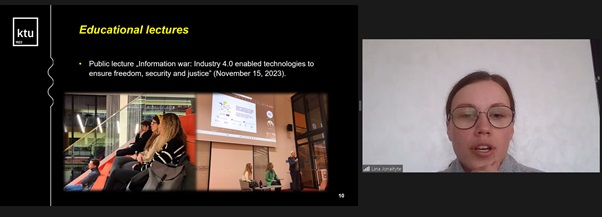
Sanita Reinsone, the founder of #ScienceForUkraine, shared her inspiring journey in mobilizing a collaboration between civil society, academia, and the business sector. Her talk underscored the importance of a united front in crisis response and the power of science and research in making a tangible impact on society.
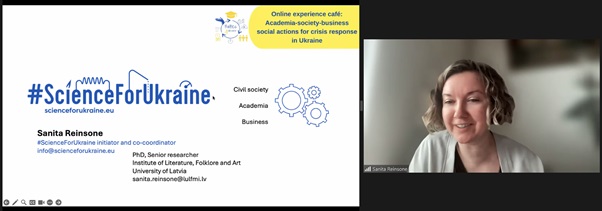
Kadri Tiisvelt from Garage48, Estonia, discussed the transformative potential of open innovation programs, hackathons, and the cultivation of an entrepreneurial mindset. Through examples of interdisciplinary collaboration, youth and female empowerment, and startup community support, she showcased how innovation and technology entrepreneurship can serve as catalysts for societal advancement.
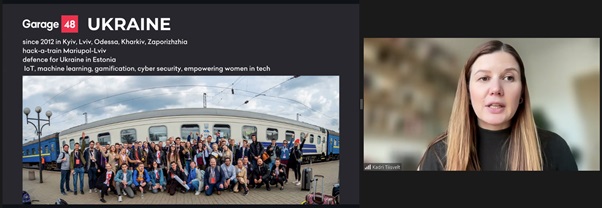
Under the expert moderation of Kateryna Boichenko, researcher at Web2Learn, the discussions transcended traditional sectoral boundaries, highlighting the imperative for cross-disciplinary approaches in solving social issues. The event not only provided a platform for sharing best practices but also paved the way for future collaborations among participants from different sectors.

The online experience café on fostering collaboration for crisis response in the Baltic region, centered around the ongoing crisis in Ukraine, offered valuable insights and underscored several critical lessons for all participants. First and foremost, the event highlighted the immense potential of cross-sectoral collaboration. When academia, business, and civil society join forces, they can leverage their unique strengths and perspectives to address complex challenges more effectively than any could alone. This synergy not only accelerates the development of innovative solutions but also ensures these solutions are grounded in a deep understanding of the needs and realities of the communities they aim to serve.
Another key lesson emerged from the discussions on the importance of open innovation and entrepreneurial thinking in crisis response. The crisis situations, while daunting, can also serve as catalysts for innovation and change. By embracing an entrepreneurial mindset and leveraging technology, communities can develop resilient and adaptive strategies to navigate uncertainties. The stories shared during the event demonstrated how hackathons and open innovation programs could spur significant societal advancements, highlighting the critical role of creativity and agility in times of need.
The power of science and academic research in informing and guiding practical action for social impact was also a prominent theme. The collaboration between academia and society, as exemplified by the initiatives at Kaunas University of Technology and #ScienceForUkraine, illustrated how research and evidence-based approaches could enhance the effectiveness and sustainability of crisis response efforts. This emphasizes the need for ongoing dialogue and partnership between researchers and practitioners to ensure that interventions are both innovative and grounded in empirical evidence.
The event shed light on the importance of inclusivity and empowerment in building resilient communities. By focusing on youth and female empowerment, and ensuring diverse voices are heard and valued, organizations can foster a more inclusive approach to problem-solving. This inclusivity not only enriches the pool of ideas and solutions but also ensures that the benefits of these efforts are widely distributed, thereby enhancing the social cohesion and resilience of communities in the face of adversity.
The necessity for ongoing engagement and commitment to collaboration was a recurring theme. Building and maintaining partnerships across sectors requires continuous effort, mutual respect, and a shared vision for the future. The discussions underscored that while the challenges may be daunting, the collective will and determination of individuals and organizations across sectors can pave the way for meaningful and lasting change.
In summary, the online experience café offered a compelling look at the transformative power of collaboration, innovation, inclusivity, and sustained engagement in addressing the challenges posed by crises. These lessons, drawn from the rich experiences and insights shared by the participants, provide a roadmap for building more resilient and inclusive communities in the Baltic region and beyond.
If you missed our online cafe, it is now available on Youtube here.
We gladly share the slides of the event here.
As we reflect on the success of the online experience café, it is clear that the path forward requires continuous dialogue, mutual understanding, and collaborative efforts. The insights and commitments gained from this event represent a promising step towards enhancing societal resilience and well-being in the Baltic region and beyond, especially in times of crises. We look forward to building on these foundations, fostering further partnerships, and continuing to make a difference in the communities we serve.